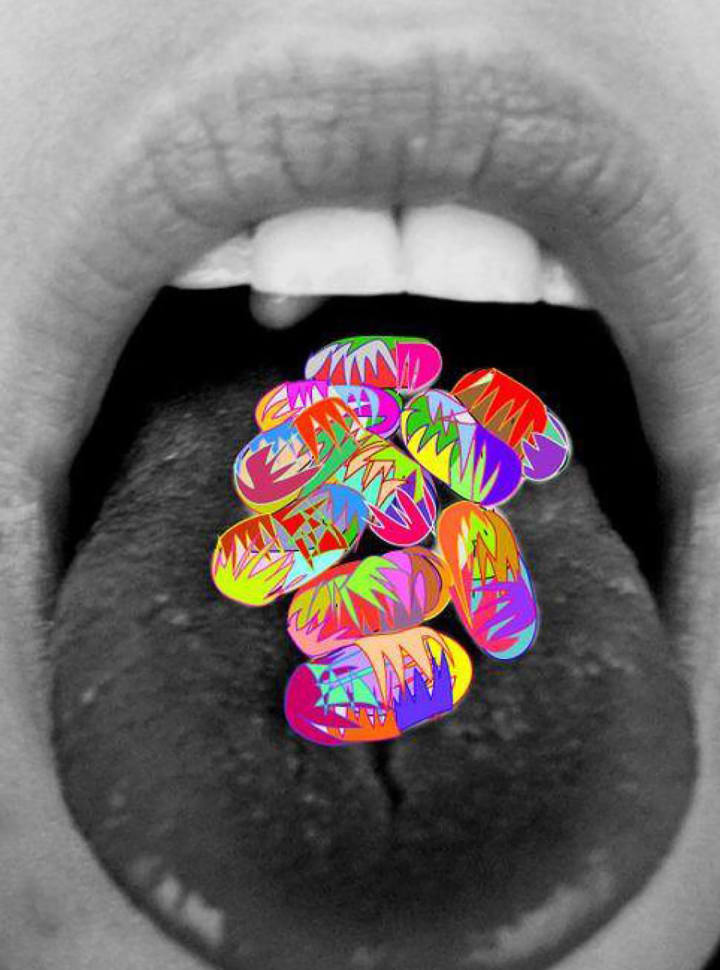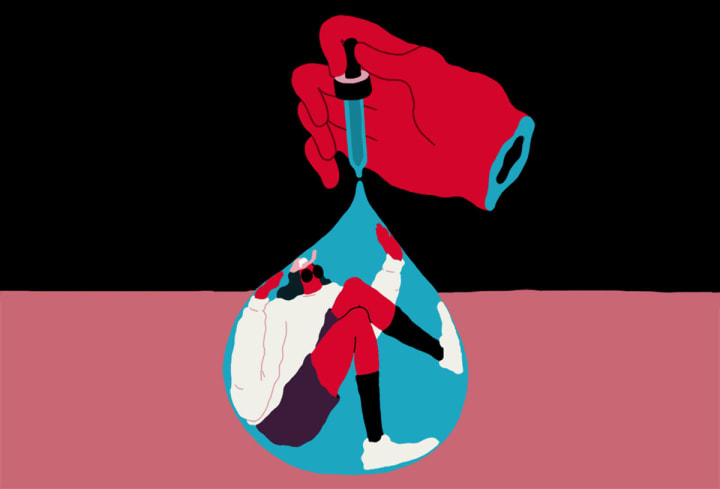Trippy Drugs of the Future
Perhaps as close as your nearest seller, trippy drugs of the future may be right around the corner.

It is the future. Paul Reeves, twenty-eight, energetic, and successful, is the sales manager of a company that sells underwater real estate. He sits at his desk in his company’s offices in a steel-and-glass office park outside of Central Park, planning his day. On the walnut-veneered desk top, ready to be manipulated at finger-tip touch, are a computer and a TV-telephone console with worldwide communication facilities.
At noon, Paul is having lunch with Martin Yoshida of Takahara Helicopter, the most popular compact ‘copter in America. Takahara wants to build a plant in the ocean-floor industrial park that Sea Floor has just opened on the east coast of Delaware Bay.
Paul is determined to clinch the deal. He’s met Yoshida before, and the helicopter man struck him as an easy-going, fun-loving guy. He’d probably enjoy a few Dry Marties before lunch, Reeves decides. Marties are pills that produce the same excitement and enthusiasm as martinis, but contain no calories and have no harmful effect on the liver.
Paul switched on his desktop computer and placed an order for Marties at the corner dispensary. He arranged to pick up the pills before Yoshida would arrive. Suddenly he remembered that Gudrun was flying in from Stockholm tonight. She would be arriving on the 8 o’clock transfer, and Paul recalled their last time together. They were all hopped up on their favorite trippy drugs, and had an amazing time.
Gudrun, meanwhile, was sitting with her laptop, trying to construct her latest beat. She had been working on it for weeks, and she wasn’t happy with her progress. She knew that eventually she would come up with the musical answer to her problem, but she didn’t know how long it would take. She decided to take a Sense 2, a pill that would sensitize her hearing and improve her concentration. The sense capsules were marvelous, Gudrun thought. Sense 1’s sharpened vision. Sense 3, 4, and 5 capsules enhanced smell, taste, and touch.
Gudrun sat down to wait for the drug to take effect. Gudrun’s phone rang, she answered, and a hologram of Paul’s head appeared above the screen. He wanted to discuss their plans for the weekend. Yoshida had invited them to a baseball game, and though neither of them particularly liked the sport, Yoshida had promised to bring some Mitties along with him to make it more fun.
Dropping a Mitty was a peak vicarious trippy drug experience. It gave you the sensation of being whomever you concentrated your thoughts on. At the stadium, when Paul swallowed a Mitty, he knew that he was the one who hit home runs, who made marvelous catches, and who slid across home plate with the winning run.
Gudrun sighed. If only they would be Mittying at a concert! “Yes, of course it’s all right,” she said. “But promise that we’ll have the rest of the weekend to ourselves.”
Paul promised, and as they said goodbye, his face disappeared into the air.
Gudrun returned to her laptop. She placed her hands on the keyboard and was able to hear each vibration as she messed around with the beat. Her spine tingled. Bless those pills, she thought. This will be a productive afternoon.
Taking a Trip into the Future

Image via We Heart It
Is this an accurate and authentic scenario for life in the future? Will we actually be able to go to a pharmacy or liquor store and buy Dry Marties, Mitties, and Senses 1 through 5—not to mention a host of other equally astounding pleasure and sensitivity trippy drugs as yet unthought of? The answer, according to futurologists, medical researchers, psychologists, and other scientists, is an unqualified "yes." The process, in fact, is already on its way. Alexander T. Shulgin, a California researcher whose primary activity is “designing” new drugs, has already developed several that amplify specific senses. His pills can perform such precise functions as enhancing visual color sense or sensitizing auditory power, without intoxicating or inducing hallucinations in the user. Shulgin has also developed the Dry Marty, which he calls the “low-calorie martini.”
Certainly life will be sharply different in the future, and a prominent aspect of the change will be the ready availability of short-term intoxicants. This forecast is reinforced by today's trends in the use of pleasure drugs. Marijuana has become matter-of-fact. Cocaine has been widely accepted as a relatively innocuous stimulant. As Lester Grinspoon and James B. Bakalor of Harvard Medical School, the authors of Cocaine: Its History, Uses and Effects, point out, the drug had rapidly gained unofficial respectability. Its use has spread from the ranks of creators and status groups—musicians, writers, filmmakers, and the trend-setting “in” crowds—to young professionals and other members of the upper-middle class.
One of the leading researchers into the effects of mind-altering trippy drugs during his time, Dr. Nathan Kline, former director of the Rockland Psychiatric Institute, pointed out that society is currently receptive to the idea of drugs that “increase sensitivity and pleasure.” Kline, co-author of Psychotropic Drugs in the Year 2000, believed that pharmaceutical companies have the ability to develop a drug superior to alcohol, marijuana, and cocaine—one that provides short-term pleasure with minimal side effects.
Pleasure Drugs

Image via SashaDrug
There are compelling sociological forces pushing society toward the concept of trippy drugs as a legitimate and valuable aspect of life. Technological and medical progress are inducing fundamental changes in society. Looking into the future, we will live much longer, be more mobile, have a huge range of technological options for the decisions we make—how and where we live and work. In addition, leisure time will be a major component in our lives, giving us more opportunity for self-development, including the expansion of the activities we consider to be pleasurable. All of these factors, together with the Western ideal of active, energetic striving toward goals rather than resignation or passive enjoyment, will dissipate the current fear of pleasure drugs. People will realize that it's possible to control and enhance the “pleasure side” of life, just as we’ve controlled other elements, from living and working conditions, to health and education.
Current drug research confirms these trends and potentialities. Among the most exciting research now proceeding:
- The creator of a low-calorie martini drug, Alexander Shulgin, has also developed a variant of mescaline that eliminates fatigue and increases motivation. The drug is not a stimulant to normal people, but it helps people who are working below their capacity to gain back their normal motivation. The compound is now being tested by a drug company, with the prospect that it will be commercially available as an antidepressant.
- Yet another compound Shulgin has created, DOET, enhances creativity by prompting insights and focusing attention on previously unnoticed aspects of a situation. The drug does not guarantee that everyone will paint like Picasso, but it has unlocked inspiration in those with already-demonstrated talent.
- Dr. Andrew Weil, a Harvard-affiliated drug researcher, advocates coca chewing gum as a prescription drug to end fatigue. The natives in the valleys of the Andes who chew leaves of the coca plant do so just as casually as we drink coffee. Cocaine, of course, has the same effect, but in a highly-concentrated form.
- A Belgian pharmaceutical company, UCB, investigated nootropic, which means “goes to the mind.” Nootropic clears the head and improves mental functioning. It was being tested mainly to help people recover from the trauma of accidents, and to help older people restore their formal mental quickness. Eventually, though, nootropic will be available to the general public.
- Scientists now conceptualize drugs that help people to regulate their sexual response. These take the form of both aphrodisiacs and drugs to suppress sexual activity. In the United States and England, scientists researched a chemical manufactured in the brain called LRH (luteinizing releasing hormone), which promotes the formation of reproductive hormones and restores sexual potency in impotent males. For men 20 and older, therapy for a year or less has restored potency and elevated sperm counts from zero to five million. In men from 14 to 20, in whom puberty was delayed, complete sexual functioning was established in about a month.
- Research is proceeding on a safe, short-acting drug to reduce the need for sleep. Although little work has been done in this area, scientists in this country and Mexico have been experimenting with an improved sleeping pill that does not interfere with dreaming as it cures insomnia.
Other sensitivity drugs now on the drawing board or being discussed would further affect the basic functions of life and of the mind, such as sex, sleep, memory, fatigue, and the sense of time—altering responses in startling new ways. Dr. Kline believed that the future will bring us drugs to deepen our awareness of beauty, to create conditions of novelty or familiarity, and to facilitate the experience of things vicariously. He was also intrigued by drugs which will shorten or extend experienced time. “Many drugs have been popular with musicians because they prolong time,” Kline said. “When time is stretched out, the musicians can be more precise. They don’t have to make split second decisions as they play.” On the other hand, there are certain experiences we’d like to complete as quickly as possible, and it would not be difficult to produce drugs which make a person feel as if time has been sped up.
The Future Comes with Moderation

Image via Esquire.kz
How long will it be before these drugs are readily available? “That atmosphere,” said Dr. Kline, “has changed since 1971 when I wrote my book. The greater tolerance for the use of drugs that give pleasure is the beginning of an atmosphere in which further research can take place.”
With regard to drug abuse, Dr. Kline made a distinction between a drug as a treat and a treatment. “A treat enhances a pleasurable situation,” he says. “But when you use drugs continuously for relief of an intolerable situation, or as a substitute for reality, you're in for real trouble.” The key, of course, is moderation. Kline did not see anything wrong with adults using drugs for pleasure, as long as this use did not interfere with responsible behavior. “If the pharmaceutical companies would just listen to me,” Kline declared, “they would not only increase the sum total of human enjoyment, but they would probably make money, too.”
There is indeed a reluctance on the part of the ethical drug companies to research pleasure drugs. Part of their conservatism is based on society's fear of drugs—a fear of the unknown. Federal Judge John Oliver, Justice of the Fifth Circuit Court, St. Louis, and a member of the American College of Neuropsychopharmacology's Panel on Drugs and Society, said that the scientific community has a responsibility to educate the public, particularly the Congress and judiciary, about drugs available now and those that will be discovered in coming years. Only with education will new drugs and new uses of drugs be accepted as beneficial to society, and popular acceptance on a broad scale will be necessary before pleasure drugs become legally and easily available.
The Unknown

Image via Boston Magazine
Dr. Kline was well aware of the necessity for public education. “When coffee was introduced in the 16th Century,” he pointed out, “it was regarded as the ruination of society. Tobacco was treated in the same way. When the first man to smoke tobacco in Europe, a sailor with Columbus, came back with a 2" long American Indian cigar, he was thrown in jail for three years. People thought that anybody who could inhale and exhale smoke must be in league with the devil. But both coffee and tobacco were eventually accepted.”
Marijuana certainly took the same route, and the movement toward legalization in all states has the overwhelming force of reality behind it. The reason that penalties for possession have been greatly relaxed in recent years is a general recognition that its use is not a “crime” that harms others, but simply a personal, pleasurable indulgence. With legalization, its sale has been standardized, and has become available at local retail dispensaries, coffee shops, and vending machines—earning the government money through an excise tax.
Undoubtedly there are restrictions on marijuana use—it can not be sold to minors, for one thing. But the legalization of marijuana has hastened the impetus toward extensive research into safe, pleasure-giving intoxicants and other sensitivity drugs—research which, as we've seen, is already well under way.
Escape from Reality

Image via Its Nice That
The incontrovertible fact is that society has always had a need for intoxicants. Martin M. Katz, chief of the clinical research branch of the National Institute of Mental Health, points out that the impulse involved here is the need for people to transport themselves from one reality to another—from one psychological state to another. This idea releases inhibitions. This, in turn, makes us more willing to subject ourselves to new and different experiences, and thus to become more fully aware of the potentialities of life.
That is precisely why it may not be too far into the future when we will all be visiting drug renewal centers, solely for the purpose of reviving our senses, in exactly the way that we now go to a health spa to revive our bodies. In the future, “getting high” will surely take us along a highway leading to new vistas of sensitivity, and to a many-splendored landscape of pleasure.
About the Creator
Sigmund Fried
Not his real name, but he wishes it was. Wasted, waxing philosophical.






Comments
There are no comments for this story
Be the first to respond and start the conversation.